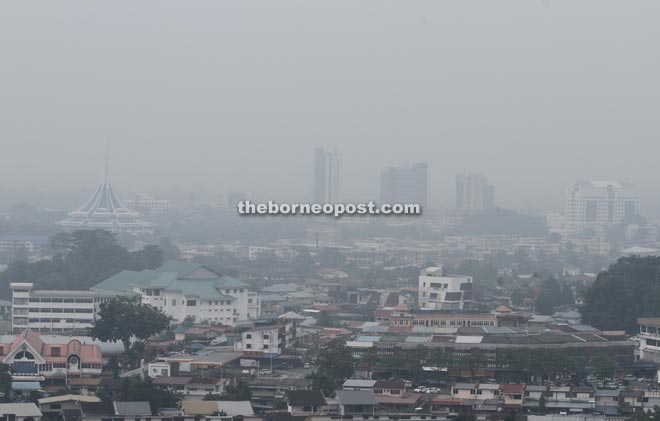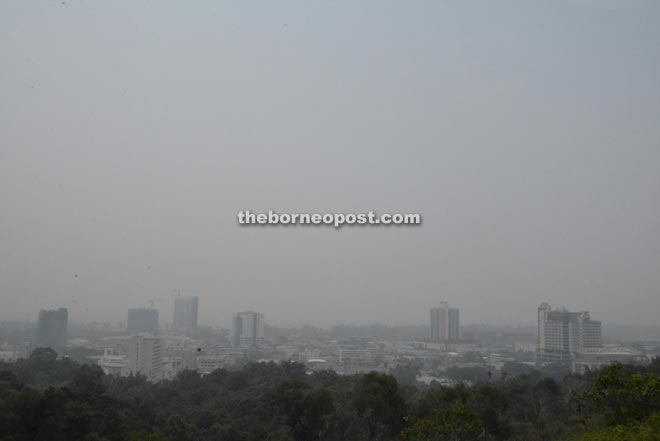
A picture of Kuching city taken at 3pm yesterday from the 17th floor of Bangunan Sultan Iskandar showing the extent of the transboundary haze. — Photo by Chimon Upon

A view of Miri City yesterday afternoon.
KUCHING: Indonesia has identified hundreds of hotspots throughout the republic that are blanketing Sarawak and other parts of Malaysia with haze in the past two weeks.
Its Consul General here, Jahar Gultom, said President Joko Widodo recently visited South Sumatra to assess the situation and stressed the urgency to douse the fires.
“The fire is uncontrollable, but we do not want to surrender just like that. Currently, everybody, from the president and ministers down to the governors, are on the ground to put an end to these fires.
“As the consul general here, all I can say on behalf of the Indonesian government is that we are truly sorry for the transboundary haze,” said Jahar to The Borneo Post yesterday.
He added that the latest major hotspot was in Sulawesi, after Kalimantan and Java. Besides the ‘slash-and-burn’ clearing methods for plantation, the haze was also due to bush fires, which have spread to forests and national parks in Central Java and South Sulawesi.
“The El Nino phenomenon is also a contributing factor to the dry weather, causing bush fires, which can spread very quickly,” said Jahar, adding that more assistance from the international community was needed to tackle the issue effectively. Indonesia, he said, was currently renting an aircraft from Australia to water bomb South Sulawesi.
“I sincerely think we need more of such aircrafts to water bomb and carry out cloud seeding in affected areas.” Local and international non-governmental organisations (NGOs) based in Indonesia, he said, were also providing feedback on how the Indonesian government could tackle the situation. On another note, Jahar said his office had received a letter from the state DAP, highlighting the issue of the transboundary haze.
“We have received the letter and understand their concern. The letter will be forwarded to our consulate’s headquarters.”
The letter, he disclosed, also enquired if there were Malaysian plantation companies involved in illegal burning.
“If there is, it can only be made known sometime next month, when the police have completed their investigation.”
Meanwhile, state DAP chairman, Chong Chieng Jen, in his letter stated that for the past two decades, transboundary haze had become an annual problem for Sarawak.
“While the oil palm industry in Indonesia is on the upward trend, we, in Sarawak, are made to suffer for the cost of such development,” said Chong in the letter. This, he added, was despite the fact that the Indonesian government had signed the Asean Agreement on Transboundary Haze Pollution since 2002.
Chong also highlighted the transboundary haze this year was worse than last year’s, as evident by the rescheduling of flights. A satellite image of the hotspots in Kalimantan was also enclosed with the letter to call for more action to being taken in Kalimantan to avoid the recurrence of the 1997 haze problem, when the Air Pollutant Index (API) shot above 600.
“We also urge for tough action to be taken against companies whose land and concessionaires areas found to have evidence of illegal burning. Should these companies be found to have any link with Malaysians or Malaysian companies, please feel free to publish their names so that we may also push for action to be taken against them in Malaysia,” said Chong.
Meanwhile, yesterday’s API readings, according to the Malaysian Department of Environment, had Kuching registering an API of between 99 and 117, Kota Samarahan (102-124), Sarikei (103-123), Sri Aman (120-138) and Sibu (86-101) between midnight to 5pm.
Other areas in the state recorded an API of moderate levels.An API reading of below 50 is considered Good, 51 – 100 (Moderate), 101 – 200 (Unhealthy), 201-300 (Very Unhealthy), more than 300 (Hazardous), and more than 500 (Emergency).
Meanwhile, in Miri, the API reading was 60 on Sunday but rose to 85 as at 4pm yesterday.
Department of Environment (DOE) Miri chief, Mohd Fitri Said, said the his office was posting 6-hourly API readings.
He urged the public not to do open burning as it would worsen the situation.
“The department is monitoring the situation closely. Complaints of open burning activities can be lodged with the department at 085-426994.”
Meanwhile, the Malaysian Meteorological Department forecasts isolated thunderstorms and rains in various parts of the state in its 7-day weather forecast for the state, which was published on its website.
Last week, Indonesia issued an apology to Malaysia for the haze currently blanketing Malaysia and surrounding areas, including Singapore.
A report stated that Indonesia’s central government had allocated US$1mil to provinces affected by the peat and forest fires.
